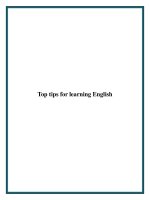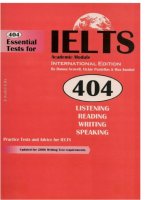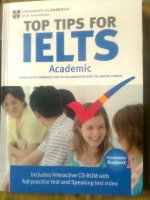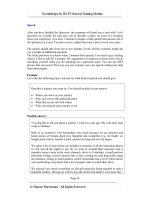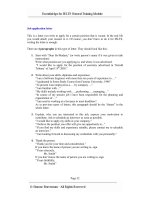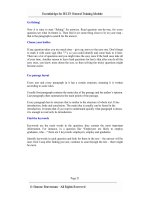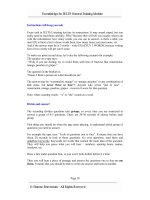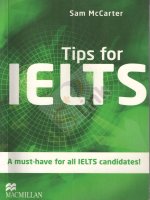Cambridge english top tips for IELTS academic
Bạn đang xem bản rút gọn của tài liệu. Xem và tải ngay bản đầy đủ của tài liệu tại đây (9.8 MB, 98 trang )
Top Tips
for IELTS Academic
UNIVERSITY of CAMBRIDGE
ESOL Examinations
Top Tips for IELTS
Academic
Produced by Cambridge ESOL
in collaboration with the British Council
Top Tips for IELTS Academic
TOP TIPS FOR IELTS
Acknowledgements
Cambridge ESOL would like to thank the following for their
contributions to this project:
Margaret Matthews, Felicity O'Dell, Michael Black and Carole Allsop.
Every effort has been made to identify the copyright owners for
material used, but it has not always been possible to identify the
source or contact the copyright holders. In such cases, Cambridge
ESOL would welcome information from the copyright owners.
Illustrations by Sandra Lockwood, Artworks Design.
University of Cambridge ESOL Examinations
1 Hills Road, Cambridge, CB1 2EU, UK
www.CambridgeESOL.org
© UCLES 2009
Copyright. The contents of this publication are covered by international copyright
law. All rights reserved; no part of this document may be reproduced, stored
in a retrieval system, or transmitted in any form or by any means, electronic,
mechanical, photocopying, recording or otherwise, without the prior written
consent of University of Cambridge ESOL Examinations. Action may be taken
against individuals and institutions who do not observe these copyright
restrictions.
First published 2009
10th printing 2014
Printed in Poland by Opolgraf
ISBN: 978-1-906438-72-2
2
University of Cambridge ESOL Examinations
TOP TIPS FOR IELTS
Contents
Introduction
4
Guide to IELTS task types
6
How to revise for IELTS
8
I
L
�©
lb
The IELTS Listening test
15
The IELTS Reading test
39
The IELTS Writing test
61
The IELTS Speaking test
75
What to do on the day
85
Answer sheets
88
Understanding your IELTS scores
94
Installing the CD-ROM
95
Top Tips for IELTS Academic
3
TOP TIPS FOR IELTS
Introduction
Top Tips for /EL TS is an essential part of your revision for the International
English Language Testing System (IELTS) test.
Each of the four main sections (Listening, Reading, Writing and Speaking)
follows the same structure and is based on a series of pieces of advice
(the 'tips') which IELTS' materials writers have collected from many years'
experience of involvement in the production of IELTS tests. Each section
starts with a tip at the top of the page. The tip is followed by an example
taken from IELTS material and a clear explanation to help you understand
exactly what it means. Each section ends with some more 'General tips'
for that component.
There is also a handy section at the beginning of the book on how to
revise for IELTS and a very important section at the back on what you
should do on the day of the test.
There is a companion publication to this book, Top Tips for /EL TS General
Training. Please note that the Listening and Speaking sections are
common to both books.
IELTS is jointly managed by British Council, University of Cambridge ESOL
Examinations (Cambridge ESOL) and IDP: IELTS Australia.
How to use Top Tips for /EL TS
Take the Top Tips for /EL TS book with you and read it when you have a
few minutes during the day. Then use the CD-ROM to practise at home: it
contains an IELTS practice test for you to try, together with the answers
for Listening and Reading and some sample answers for the Writing.
The CD-ROM also includes all the recordings for the Listening and a
video of a candidate doing an example IELTS Speaking test, to show you
exactly what you will have to do when you take the test. Practise with
some classmates using the Speaking test material on the CD-ROM and
compare your performance with the student on the video.
Top Tips for /EL TS is flexible. You can look at a different tip from a different
section every day, or you can start at the beginning with the tips for the
Listening test and work through until you get to the end of the tips for the
Spea\<.ing test. Whichever method you prefer, read the example and the
explanation carefully to make sure that you understand each tip. When you
have understood all the tips for each section, try the test on the CD-ROM.
4
University of Cambridge ESOL Examinations
TOP TIPS FOR IELTS
Guide to symbols
0
This symbol introduces the 'tip' which is at the
top of the page. Each tip is some useful advice
to help you find the right answer for Listening
and Reading. For Writing, the tips show you
how to write a better answer to the question,
and for Speaking, they explain how you can
give good answers which show your true level
of English to the examiner.
This is an extra piece of advice which is
important for this particular part of the test.
Cl
This symbol tells you to go to the CD-ROM, where
you will find an IELTS practice test to try.
We hope that Top Tips for /EL TS will help you with your preparation
for taking the IELTS test.
Cambridge ESOL
Top Tips for IELTS Academic
5
TOP TIPS FOR IELTS
Guide to question types used in
IELTS Reading and Listening
Multiple choice (Listening and Reading) You have to read a text
or listen to a recording and answer some questions. In Listening
multiple-choice tasks, you usually have to choose one of three
possible answers (A, B or C) for each question; in Reading you
usually choose one of four (A, B, C or D). In some multiple-choice
tasks, you have to choose several options from a longer list.
Identifying information (Reading) You have to read a text and a
series of statements and decide if the statement agrees with the
information in the text ('true'), if the statement contradicts the
information in the text ('false') or whether there is no information
in the text to support the statement ('not given').
Identifying writer's views/claims (Reading) You read a text and
a series of statements and say whether each statement agrees
with the views/claims of the writer. For each statement, you
answer 'yes' if the statement does, 'no' if the statement doesn't,
or 'not given' if there is no view/claim in the text to support the
statement.
Matching information (Reading) You have to locate specific
information in a paragraph or section of a text.
Matching headings (Reading) You have to choose the correct
headings for the paragraphs or sections of the text.
Matching features (Reading) You have to match numbered items
to a set of features (e.g. people or dates) from the text.
Matching sentence endings (Reading) You are given the first half
of a sentence based on a text and you choose the best way to
complete it from a list of possible options.
6
University of Cambridge ESOL Examinations
TOP TIPS FOR IELTS
Sentence, Summary, Note, Table, Flow-chart completion
(Listening and Reading) You listen to a recording, or read a text,
and fill in t�e missing information. Sometimes you complete
the task by choosing words from a box rather than words in a
Listening/Reading text. There is a limit to the number of words
you can use, so pay careful attention to this when you are
deciding what your answer should be.
Form completion (Listening) You listen to a recording and fill in
the missing information in a form. You must pay careful attention
to the maximum number of words you can write for each answer.
Diagram label completion (Reading) You complete labels on a
diagram which relate to a description contained in the text. You
must pay careful attention to the maximum number of words you
can write for each answer.
Short-answer questions (Listening and Reading) You listen to a
recording, or read a text, and write short answers to questions.
You must pay careful attention to the maximum number of words
you can write for each answer.
Matching (Listening) You listen to a recording and match each
numbered item to one of a list of options (A, B, C etc.) according
to the information you hear.
Plan, Map, Diagram labelling (Listening) You listen to a recording
and label the plan, map or diagram according to the information
you hear.
Top Tips for IELTS Academic
7
TOP TIPS FOR IELTS
-Howtq revise for IELTS
It is important to use the time you have to revise for IELTS effectively.
_ Here are some general ideas to help you do this.
_Make a plan
It is a good idea to make a plan for your last month's study before the
test. Think about:
• what you need to do
• how much time you have
• how you can fit what you need to do into that time.
Try to be realistic when you make your plan. If you plan to do too
much, then you may soon be disappointed when you fall behind.
Think about what you need to know
Most things that you do in English will help you to improve
your language skills - reading an article or watching certain TV
· programmes may be as useful as doing a grammar exercise.
it is very important, however, that you know exactly what you will
have to do in the test. Doing some practice tests will help you
develop good exam techniques and this will h.�lp you a great deal in
- the exam room. But don't spend all your revision time doing practice
papers.
Think about which skills you need to improve. ff you are attending an
IEL TS preparation course, ask your English teacher what you need to
work on - listening, reading, writing, or speaki_ng.
Look back at your homework. What mistakes did you make? Do you
understand where you went wrong? How can you improve?
8
University of Cambridge ESOL Examinations
TOP TIPS FOR IELTS
Have what you need to hand
In order to prepare for IELTS you probably need:
• a good learners• dictionary (one with examples of how words are
•
•
•
•
•
•
actually used in English)
some practice tests
an IELTS preparation coursebook
a good grammar book
a vocabulary notebook
notes or other materials from your English course (if you are
doing one)
a bilingual dictionary .
If you have access to the internet you can get some of these online
- the dictionaries and samples of IELTS test materials. for instance.
(See www.ielts.org and www.CambridgeESOL.org)
Also have a good supply of stationery such as pens. pencils.
highlighters and paper. Some students find it convenient to write
things like vocabulary on cards. which they then carry with them and
look at when they have a spare moment on the bus or in a cafe.
Think about when and where you study
Most people find it best to study at regular times at a desk with a
good light and everything they need beside them.
Some people find they work best in the early mornings. while others
prefer the evenings. If possible. do most of your revision at the time
of day which is best for you.
However. you may also find that there are other good times and
places for you to study. Perhaps you could listen to some English on
an mp3 player while you are doing other things. Or you could read
something on your way to work or college.
Top Tips for IELTS Academic
9
TOP TIPS FOR IELTS
Organise your revision time well
Allow time for breaks when you are revising - many students like to
study for an hour and a half, for example, and then have a break for
half an hour.
Vary what you do - sometimes focus on listening, sometimes on
vocabulary, sometimes on writing. This will make sure that you don't
neglect any aspect of the language and will also make your study
more interesting.
It is sensible to do something completely different before you go to
bed - go for a walk, read a relaxing book or watch a favourite film.
Enjoy your study
Find some enjoyable activities that help your English - listening to
songs in English or watching a TV programme or DVD will generally
help your listening and pronunciation and may also extend your
vocabulary.
What do you like doing in your free time? Could you combine that
with English practice? For example, if you like a particular sport
or singer, or if you are interested in news or computer games, you
will be able to find something in English about your interest on the
internet.
Study with a friend - you can practise talking to each other in English
and can perhaps help each other with any questions you have.
Keep fit
Don't forget that feeling fit and healthy will help you get good marks
too:
• make sure you get enough sleep
• remember to eat well
• take some exercise.
Now here are some ideas to help you organise your revision for the
individual parts of IELTS.
10
University of Cambridge ESOL Examinations
TOP TIPS FOR IELTS
The IELTS Listening test
Even if you are a long way from an English-speaking country, there
are a lot of things you can do these days to give you practice in the
kinds of listening you will have to deal with in the IELTS Listening
test. Here are some ideas:
• Go to the websites of universities in English-speaking countries
•
•
•
•
- these often have links where you can listen to students or staff
talking about the experience of studying in their institution.
You can find TV and radio programmes on topics relevant to IELTS
on the websites of national public broadcasting organisations
like the BBC (www.bbc.co.uk/iplayer), PBS (www.pbs.org) and
the Australian Broadcasting Corporation (www.abc.net). You can
access some of these wherever you are in the world, but some
programmes are only available to people living in the country
where the broadcaster is based.
Find the tourist information website for a country that you would
like to visit - such websites often now have video clips which
provide useful listening materials.
Many libraries and museums now also have websites with video
materials which can provide useful listening practice.
Search YouTube (www.youtube.com) for interesting recordings
- use keywords like 'lecture' or 'tutorial', or 'study skills' or 'lab
reports' and you should find plenty of clips to help you practise.
The IELTS Academic Reading test
The more you read before the test, the better you will do. Reading is
also a very good way of improving your vocabulary and grammar and
it will also help your own writing.
In the Academic Reading test you will mainly have to read the kind
of factual or discursive texts that have an academic relevance. It is
therefore sensible to revise by reading plenty of texts of this kind.
Look for articles in quality newspapers, magazines and journals
focusing on academic topics (e.g. science, humanities, economics,
current affairs, sociology).
Top Tips for IELTS Academic
11
TOP TIPS FOR IELTS
• Make sure you read from a wide range of sources including
•
•
•
•
something from each of the text types listed above - you can
easily find examples of all of these on the internet as well as in
printed form.
It's important to read for pleasure, so regularly read something
that you enjoy - novels, sports reports or magazine quizzes may
not feature in IELTS but reading them will also help you develop
your knowledge of the language in an effective way.
Keep a reading diary - write a couple of sentences in English
about what you have read. This should also help you to learn
some of the words and expressions you have read and will also
help you with the IELTS Writing paper.
Discuss what you have read with a friend - perhaps start a
reading club to do this on a regular basis.
Don't look up every word that you are not sure about when
you read. Just look up anything that seems to be important for
a general understanding of the text. When you have finished
reading you can then, if you want, go back and check the
meanings of less important vocabulary.
Examples of things you might like to read include:
• graded readers and magazines
• translations of books you have already read in your own
language
• travel information about your own country or places you have
been to
• newspaper articles
• music, film or book reviews.
Other good sources of appropriate reading material for the IELTS
Academic Reading test include:
•
textbooks
• encyclopedia entries for topics that interest you
• language-learning materials that focus on academic vocabulary.
12
University of Cambridge ESOL Examinations
TOP TIPS FOR IELTS
The IELTS Academic Writing test
In the Academic Writing test you will have to describe and explain a
graph or other visual material (Task 1) and write an essay giving your
opinion on a. topic (Task 2).
Practise writing answers to exam type tasks on a regular basis - if
possible, ask a teacher or other good English speaker to correct your
work. Pay attention to the comments they make and try to improve in
the next piece of writing you do for them.
•
•
•
Always think about the structure of what you are going to write make a plan first.
In your writing make a point of using new words and expressions
that you have recently learned - if necessary use a good learner's
dictionary for good examples of how words are used in practice.
Practise checking your writing carefully so that it is as accurate
as possible - look particularly for the kinds of mistakes that
you know you often make (mistakes with verb agreement,
prepositions or articles, for example).
The IELTS Speaking test
Make the effort to practise speaking in English whenever you can.
•
•
•
•
•
Make sure that you know how to talk about your own work and
study experiences and plans - become familiar with the relevant
language by reading articles on the internet about, for example,
your chosen profession and about university courses.
Make sure that you know how to express your opinion on a range
of general topics, giving examples and reasons to explain why
you think as you do - become familiar with the relevant language
by listening to radio or watching TV programmes in which people
give their opinions.
If there are students in your area whose first language is English,
try to make contact with them - perhaps you could exchange
conversation sessions with them - half an hour in English and
half an hour in your first language.
Try to make contact with English-speaking visitors to your area.
Practise with friends by agreeing only to talk in English for half an
Top Tips for IELTS Academic
13
TOP TIPS FOR IELTS
hour on a regular basis - choose a specific topic to discuss for
that time.
• Join an English language club if there is one in your area.
• Make sure that you can do these things with ease in English introduce yourself, agree or disagree, ask someone to repeat or
explain, give arguments for and against, make hypotheses, talk
· about your own experiences, justify a point of view - as you will
almost certainly need to do most of these in the Speaking test.
We hope these ideas will help you to make the most of your revision
time. Above all, we hope that you enjoy your studies and wish you all
the best for your exam.
14
University of Cambridge ESOL Examinations
TOP TIPS FOR IELTS
The IELTS Listening test
What's in the Listening test?
Section 1 @
a conversation in an everyday social
context between two people
Section 2 @
a monologue in an everyday social context
Section 3 @
a conversation in an educational or training
context between two or more people
Section 4 @
a lecture or talk on a topic of general
academic interest
(0
0
1 mark for each correct answer
Approximately 40
)
minutes
(including 10 minutes to copy your answers onto
the answer sheet)
Each section has 10 questions.
The following question types are used in the Listening test:
•
•
•
•
•
multiple choice.
matching
plan, map, diagram labelling
note completion
form completion
•
•
•
•
•
table completion
sentence completion
short-answer questions
summary completion
flow-chart completion
Any of these question types may appear in any section. Not all
question types will appear in an individual Listening test.
Top Tips for IELTS Academic
15
TOP TIPS FOR IELTS
Listening: multiple choice
A TIP: Don't choose an option just because you hear a word
'J from it. Think about the whole meaning of what is said.
Example
Here is a question from a task about a field trip.
@ What did the students see on their walk in the mountains?
.
g
�
m a.group of unusual animals
m some rare plants ./
[ii an interesting geological feature
TUTOR:
STUDENT:
TUTOR:
STUDENT:
How did you enjoy the field trip to Scotland?
Well. we had some fantastic walks. One day we
walked along an amazing deserted beach. We
must have walked for about fifteen miles and we
saw a seal which was basking in the sunshine. It
was there all by itself.
How lucky! They're such beautiful animals and it's
quite unusual to see them there.
That's right. Another day we climbed the mountain
behind the hut where we were staying. We were
hoping to find some rare ferns that are supposed
to grow there and nowhere else in Scotland. We'd
just about given up hope when we found some at
the bottom of a rocky slope. They have a number of
very interesting features, for example ...
Explanation: The correct answer is G), but the mention of an
unusual animal (a seal, although only one) might lead you to believe
that FJ is correct. Similarly, the phrase 'interesting features' might
tempt you to the answer c.]. In other words, you need to understand
the recording as a whole rather than jump to a conclusion simply
because you hear words from one of the options.
16
University of Cambridge ESOL Examinations
I
TOP TIPS FOR IELTS
Listening: multiple choice
A TIP: Sometimes in a multiple-choice question you have to
'J complete a half sentence with one of the options. If you
change the first half sentence into a question it often makes
it easier to choose the right answer.
Example
Here is a question from a task about a lecture on a scientific experiment.
@ The study was carried out in order to
m determine the health benefits of eating tomatoes
m investigate whether tomato tablets could protect against
heart disease .I
&] establish the side-effects of a range of nutritional
supplements
g As we are all well aware, some nutritional supplements have
1�
v<
�
some undesirable side-effects. The Robinson research that
we're going to look at today seems to have determined quite
conclusively that the tomato tablets under consideration have
no significant side-effects at all. However, his main focus was
on their health benefits. It's long been known that a diet rich in
tomatoes seems to be very good for our hearts. However, until
recently it has been impossible to preserve the health-giving,
antioxidant properties of tomatoes in tablet form.. Robinson
wanted to find out whether these supplements would really
have the same health benefits as a tomato-rich diet.
Explanation: In this case the question would be 'Why was the study
carried out?' and mis the correct answer. mis incorrect because
the speaker says that the health benefits of eating tomatoes have
long been known - there was therefore no need for a further study
into this. DJ is incorrect because it relates only to the side�effects of
tomato tablets (and not a range of nutritional supplements) and also
because the issue of side-effects was not the main focus of the study.
Top Tips for IELTS Academic
17
TOP TIPS FOR IELTS
Listening: multiple choice
A TIP: You will hear some reference to all the options in the
'J list, but some of them will not be an appropriate answer to
the question.
Example
Here is a question from a task relating to a student's lab report.
@
g
Which TWO sections of her work does the student need to
improve?
m conclusion./
m figures./
[!] procedure
m results
II
STUDENT:
l
o...
0::
u
1./')
L.i.J
0...
TUTOR:
STUDENT:
TUTOR:
18
aims
How was my lab report this time? Do you think it
was better than my last one?
Yes, it was much improved, particularly the clear
way in which you described the procedure. I also
felt you laid out the aims very clearly, which gave
a good impression from the start. You could
think a bit more in future about the conclusions
section, though. That felt a bit hurried to me
even though you'd actually made a -first-class
job of writing up the results.
What about the way I presented the-figures?
Was that OK?
Yes, I liked it. But don't forget that you need to
label them all and then you can refer to them more
easily when you're describing them in your text.
University of Cambridge ESOL Examinations
I
TOP TIPS FOR IELTS
m and the figures m.
Explanation: The tutor suggests that the student can improve the
conclusion
The tutor makes positive comments about procedure[!), results I!]
and aims (El.
Listen to everything the speaker says
before you choose the' answer, in order
to be sure that you are selecting .the.
correct· options.
Top Tips for IELTS Academic
19
TOP TIPS FOR IELTS
Listening: multiple choice
A, TIP: You may find it useful to cross out each option that you
'J hear being eliminated.
Example
Here is a question from a task relating to a lecture on languages.
'
@
·
Which three things is the lec.tu,re co�rse going to cover?
m�
m language change./
DJ language families
multilingualism .t
(I pronunciation
sociolinguistics I
¥ocabulary
ID
II
BJ
n11 Welcome to the nrst lecture in our course on linguistics.
'1
�
�
�
�
0.::
20
oday I'm going to-start
witFi a brief look at the -relationship between society and language and we'll continue
with that topic next week However, nrst I'm going to give
you just a quick overview of what the course will cover over
and above that nrst topic. So, last year we looked together
at aspects of language such as vocabulary and how words
combine to communicate meaning in a way that is considered
'grammatically correct' by the language's speakers. We're
leaving these aspects of language now to tak=e�a s=l�igh= tl
� y� ��-.....,_-,
=
�
broader view. We'll look for instance at how· eoplecope in
ocieties wnere it S necessary for them to operate in more
han one languag . This is the case for a surprisingly large
number of people who speak one language in their family and
another at school or work. I'll leave for the moment issues
relating to pronunciation as you'll be having a separate
phonology course from Dr Thompson in the next semester.
owever, ow anguages ave eve ope-over time\vi e t e
hird important theme of this course.
I
����I·
University of Cambridge ESOL Examinations
TOP TIPS FOR IELTS
m
Explanation: The correct answers are D], D] and (I. Both grammar
and vocabulary [il w_ere dealt with last year. Pronunciation �
will be covered on a different course. The speaker doesn't refer
to language families [!I - he uses the word 'family' in relation to
bilingualism.
Top Tips for IELTS Academic
21
TOP TIPS FOR IELTS
Listening: matching
A TIP: The numbered items appear in the order in which you
'J hear them, but the options (A-F) do not. Make sure that you
read all the options before the recording starts.
Example
Here are two items from a task about finding temporary work.
@
What does Jenny say about each type of job?
Jenny's opinion
m good opportunity to gain useful experience
m hours tend to be inconvenient
01 jobs available for people �ith specific skills
m pay is surprisingly good
GI plenty of work at the moment
II
Jobs
D
work is popular with students
hotel work
IPJ telephone sales
g There
,
... � ...
... ...
are plenty of opportunities for temporary work in hotels
available at the moment. It's quite hard work but you don't
� need any special skills. You can actually earn a lot more than
� you might imagine and it's often possible to choose the hours
that are most convenient for you.
�
IYou might also be interested in doing something in telesales.
It doesn't matter if you haven't got any previous experience of
this. It's work which local undergraduates often choose to do.
The hours tend to flt in well with lectures and other university
commitments.
1-
22
University of Cambridge ESOL Examinations
I
TOP TIPS FOR IELTS
Explanation: 'You can earn a lot more than you might imagine' is
another way of saying the 'pay is surprisingly good' I!]. The last two
sentences make it clear, using quite different words, that the 'work is
popular with students' [i.
The words that you hear that give you the
right answer may not be the same as the
words on the page. On the other hand,
you may hear the exact word from one of
. , . the options, b11t this do�s not necessarily
mean. that it is the right answer.
Top Tips for IEL TS Academic
23
·TOP TIPS FOR IELTS
Listening: map labelling
A Listen carefully for the starting point - you need to start
'J at the correct place in order to get the questions fight.
TIP:
Example
Here is the start of a task about a shopping mall.
/@
Label the map below.
/
�� �
N .. - .t
0
,'
'
i
I
0 ., .
.,
West
entrance
11
ft
�;�-�:
24
',j[ "" �'
..
,
,.
..
.. ...,.,·-
Freshfields
Supermarket
ll'
I�
'-..
0
,I North
entrance
"'
;,•
D
--
Waterside Shopping Mall
..
.,.N
·-·-
�··
•.
,0 ...,,
�J
1
t��; ,.
-
.
.....:.,,.�..ii:"'
'
,.
J
'
Sporty
Sports
"'
",If',
�
{]
South ·�
:�entrance
t
H�
Oil'.
"'."..
0
�"- ..
.•.
�..,.,.. �;:" --�
' ,. •"
East
entrance
_., .
.
o ,,
'.,
,
Jones department
store
Toni's
Shoes
You are here
•
-
Car park
.
I
.1
-
UJ . . .
pizza restaurant ....
University of Cambridge ESOL Examinations
I

